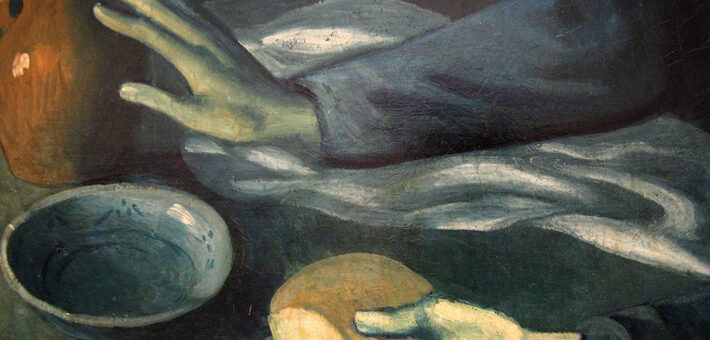Commentary on Genesis 18:20-32
This week’s first lesson moves the narrative from a divine encounter under the terebinths at Mamre to the road to Sodom.
As the narrative makes this shift, keep in mind the Lord’s question to Abraham (and indirectly to Sarah and to all of us who might giggle at the ridiculous promises of the Lord), “Is there anything too extraordinary for the Lord?” (Genesis 18:14a) With this question echoing from last week’s reading, we find ourselves en route to the emblem of sin and wickedness — and to a whopper of an appeal from Abraham to the Lord.
Textual horizons
As seamlessly as the Genesis narrative moved from the circumcision of Abraham, Ishmael, and the rest of the men of Abraham’s house at Mamre (end of chapter 17), to the mysterious encounter between Abraham and the Lord at the terebinths of Mamre, so now the story shifts toward Sodom and Gomorrah. From a sacred covenantal space to a nefarious one.
The beautiful transition (vv.16-19, which preachers are strongly encouraged to include in this week’s reading) sees the extension of Abraham’s hospitality to its fullness. As the three visitors depart, he accompanies them on their way. He sees them off.
In the midst of this seeing-off, the reader becomes privy to an inner dialogue among the three, which by this point in the story clearly includes the Lord.1 The question that resonates among the three and from the Lord builds upon the Lord’s covenant with Abraham: “Shall I hide from Abraham what I am about to do, seeing that Abraham shall become a great and mighty nation, and all the nations of the earth shall be blessed in him?”2 To this point, Abraham is clueless of the trajectory of this seeing-off — a trajectory that moves the narrative from promise (fulfillment of the covenant with the birth of Isaac) to judgment (the destruction of Sodom and Gomorrah). It is, however, because of Lord’s covenant with Abraham that he is brought into this knowledge. Part and parcel with the covenant comes the Lord’s expectation that Abraham and his children after him will “keep the way of the Lord by doing righteousness and justice.” (v.19)
The narrative pivots in Genesis 18:20, when presumably the Lord shares the destination and purpose of this next leg of the journey with Abraham. “Because the outcry against Sodom and Gomorrah is great and their sin is very grave, I will go down to see whether they have done altogether according to the outcry which has come to me; and if not, I will know.” (v.20-21) At this point the other two visitors, i.e., the two angels / messengers of Yhwh,3 depart for Sodom. Abraham remains in the presence of the Lord, for what turns out to be a rich and remarkable appeal for the Lord’s mercy.
Abraham asks, “Will you indeed sweep away the righteous with the wicked?” (v.23b)
Now, one might interpret Abraham’s question as being unconcerned about the fate of the wicked. To say it differently, Abraham is concerned that the righteous not be collateral damage to God’s rightful destruction of the wicked. There is, however, another way to interpret this. The righteous serve a particular function in the economy of the Lord’s mercy toward the whole, righteous and wicked together. The presence of the righteous serves as a catalyst for God’s mercy toward the wicked. Just ten righteous folks stave off the judgment of the Lord Almighty. In this fascinating back-and-forth between Abraham and the Lord, Abraham urges the Lord toward mercy, fulfilling the purpose of the covenant.4
Of course the narrative continues into Genesis 19, wherein it does not turn out so well for Sodom and Gomorrah.5 God’s judgment rains down upon Sodom.
Yet, at this point in the story, Abraham’s repeated appeal to the Lord’s mercy is at the heart of Abraham’s fulfillment of the covenant. God is free to exercise judgment. At the same time, Abraham’s faithful embodiment of the covenant petitions the Lord from justice to mercy.
Homiletical horizons
What is it that the people of Sodom have done? Haggadic traditions in the Oral Torah open wide the possibilities. Inhospitality. Greed. Theft. Deception. Disregard of the poor and the orphan. Inhumanity. With perhaps the pinnacle of Sodom’s depravity is mercilessness.6 (Far too often — in a lexically ingrained way! — the sin of Sodom is associated with homosexuality, based on a narrow reading of Genesis 19:5b. Perhaps one homiletical possibility with this text is deconstructing this narrow understanding of the sin of Sodom.
Another homiletical path might consider this text in light of the petition in the Lord’s prayer: “Forgive us our sins, (just) as we forgive those who sin against us.”7 Or another: “You have heard it said that you should love your neighbor and hate your enemy, but I say to you, love your enemy…”8 What does it mean to hold this passage in tension with such passages? The tension ought not be erased, lest God’s justice be undermined.
Also, beware the cleansing of this whopper dialogue between Abraham and the Lord by leaving out Genesis 19:5f.
Notes:
1 Recall Genesis 18:1 and 18:13.
2 Genesis 18:17b-18, NRSV
3 Genesis 19:1 reports that two angels/messengers arrive at Sodom. Since there were three visitors who arrived at the terebinths of Mamre, the Lord stayed behind and two angels showed-up…
4 Genesis 18:19 invokes righteousness and justice. Consider this next to Psalm 85:10.
5 Cf., Genesis 19:24-29
6 An illustration from Jewish tradition by way of a comparison with the people of Admah: “The people of Admah were no better than those of Sodom. Once a stranger came to Admah, intending to stay overnight and continue his journey the next morning. The daughter of a rich man met the stranger, and gave him water to drink and bread to eat at his request. When the people of Admah heard of this infraction of the law of the land, they seized the girl and arraigned her before the judge, who condemned her to death. The people smeared her with honey from top to toe, and exposed her to where bees would be attracted to her. The insects stung her to death, and the callous people paid no heed to her heartrending cries. Then it was that God resolved upon the destruction of these sinners.” Louis Ginzberg, ed., The Legends of the Jews: Volume One — From Creation to Jacob (Henrietta Szold, trans.; Baltimore: Johns Hopkins, 1909, 1937) 245-250, quote from p.250.
7 Matthew 6:12, Luke 11:4.
8 Matthew 5:43f.


July 24, 2016